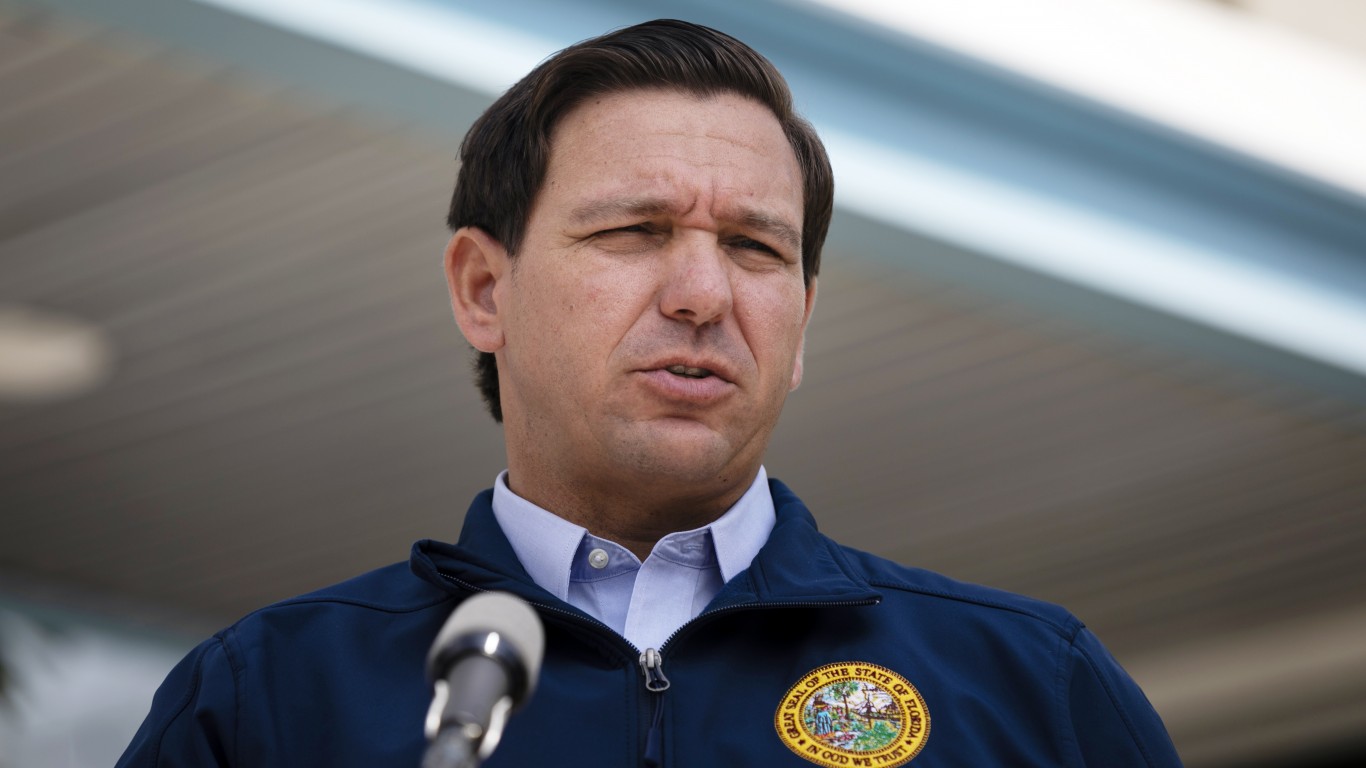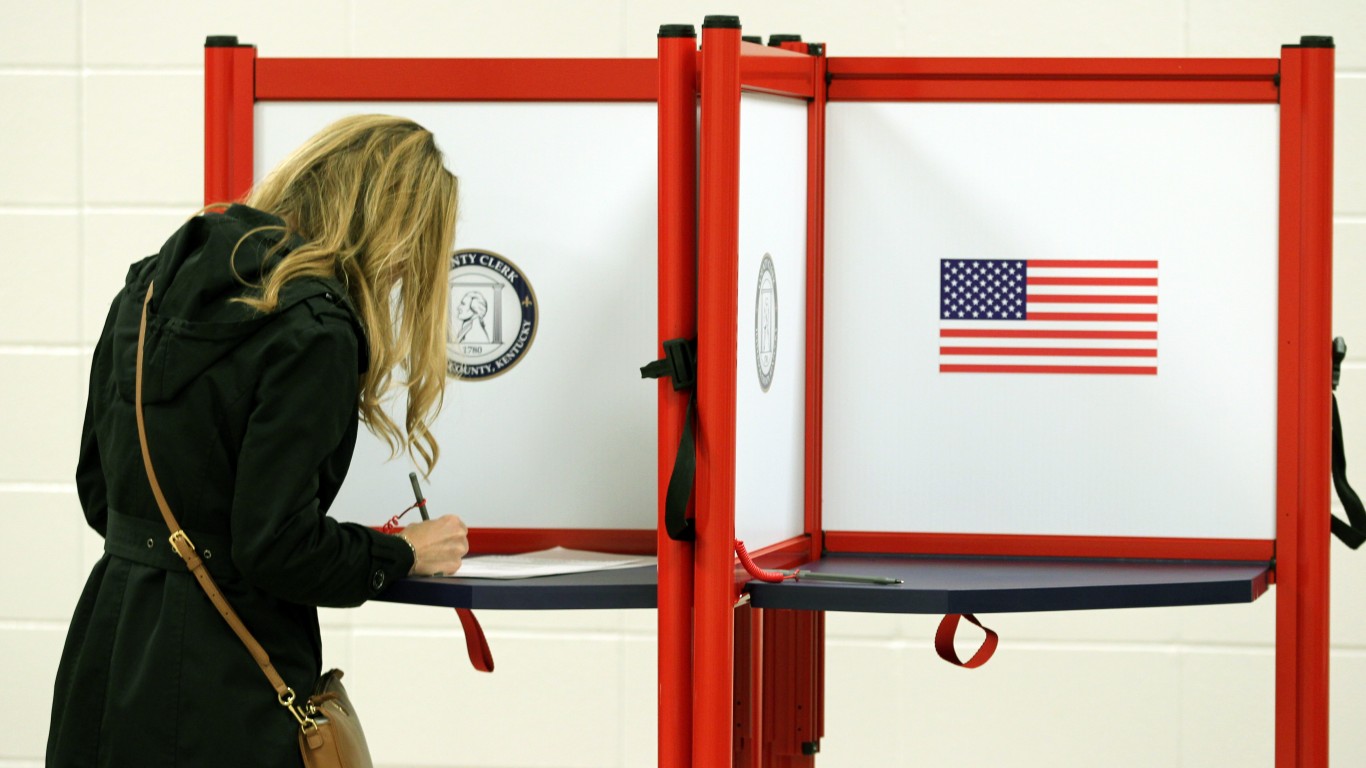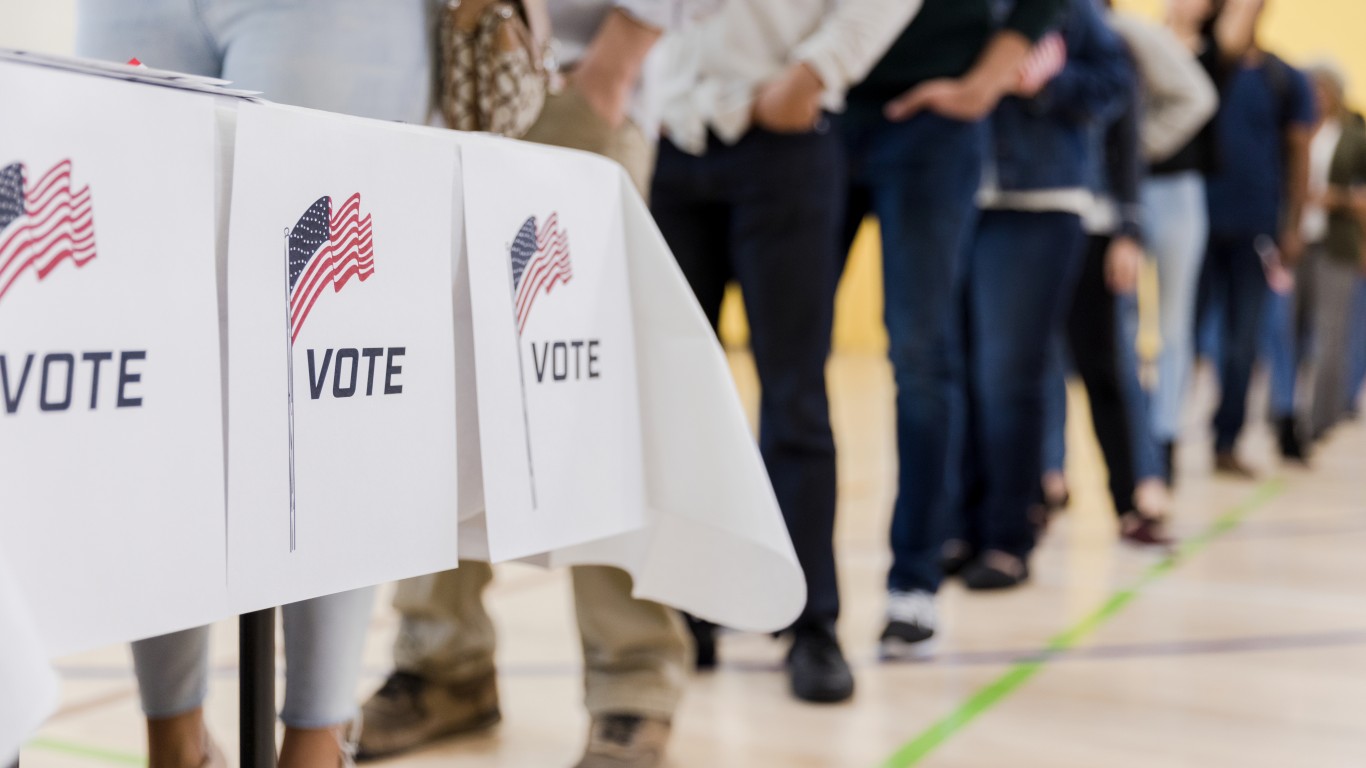
Though the 2024 presidential election is over a year away, campaign season is heating up. Already, candidates on both sides of the aisle are honing their messaging in an attempt to connect with voters. While much of the political discourse has so far focused on former President Donald Trump and his legal troubles, the most important issues to the public at large are much broader in scope. A successful bid for the White House will, in all likelihood, go to the candidate who can most effectively speak to those issues.
According to a June 2023 survey conducted by the Pew Research Center, 16 major problems facing the country are top of mind for large swaths of the general public. These problems fall under several policy categories, including public health, the economy, national security, and more.
Using Pew survey data, 24/7 Wall St. identified the most important issues to Americans in the coming election. The 16 respective issues on this list are ranked by the share of surveyed adults who see them as a “very big problem.” We also assessed the partisan divide for each issue, by comparing the share of Democrats and Democratic-leaning adults who see it as a “very big problem” with the share of Republicans and Republican-leaning adults who do.
The share of American adults who perceive each of the issues on this list as a very big problem ranges from 24% to 65%. Issues like unemployment, infrastructure, and domestic and international terrorism rank near the bottom of the list, while inflation, health care affordability, and drug addiction rank near the top. (Here is a look at the U.S. counties where opioid prescriptions outnumber people.)
Notably, the divide between Republican and Democratic voters in how these issues are perceived is often striking. For example, among Democrats and Democratic-leaning independents, climate change is seen as one of the most serious problems, with 64% of the cohort agreeing it is a “very big problem” – more than four times the 14% share of Republicans and Republican-leaning independents who do. (Here is a look at the states where carbon emissions are rising fastest.)
For Republicans, few issues are more important than illegal immigration, as 70% of party members and conservative voters surveyed agree it is a very big problem. Meanwhile, only 25% of Democratic voters do.
Click here to see the most important issues to Americans.

16. Unemployment
> American adults who see issue as a “very big problem”: 24% of those surveyed
> Likely Democratic voters who see issue as a “very big problem”: 23% of those surveyed (the lowest of 16 issues in survey – tied)
> Likely Republican voters who see issue as a “very big problem”: 23% of those surveyed (14th highest of 16 issues in survey)
Following a record-breaking spike during the COVID-19 pandemic, the U.S. jobless rate has stabilized near historic lows. The monthly unemployment rate has remained below 4% since January 2022. Still, the economy is a perennial issue in American politics, and 24% of voters see it as a very big problem.
[in-text-ad]

15. International terrorism
> American adults who see issue as a “very big problem”: 30% of those surveyed
> Likely Democratic voters who see issue as a “very big problem”: 23% of those surveyed (the lowest of 16 issues in survey – tied)
> Likely Republican voters who see issue as a “very big problem”: 36% of those surveyed (11th highest of 16 issues in survey)
Of all the top issues for American voters, international terrorism does not rank especially high. Two decades after the attacks of Sept. 11, 2001, FBI Director Christopher Wray acknowledged that while threats from foreign terrorist groups persist, domestic terrorism presents a more immediate threat, and that the FBI had shifted resources accordingly.
Republican voters are the most likely to see international terrorism as important, as 43% of the cohort identify it as a very big problem, compared to 30% of all voters, and 36% of Democratic voters.

14. Domestic terrorism
> American adults who see issue as a “very big problem”: 34% of those surveyed (tied)
> Likely Democratic voters who see issue as a “very big problem”: 41% of those surveyed (10th highest of 16 issues in survey)
> Likely Republican voters who see issue as a “very big problem”: 25% of those surveyed (13th highest of 16 issues in survey)
The FBI defines domestic terrorism as “violent, criminal acts committed by individuals and/or groups to further ideological goals stemming from domestic influences, such as those of a political, religious, social, racial, or environmental nature.”
These incidents have become increasingly common in recent years, yet Democratic and Democratic voters are far more likely to see them as a serious threat than their Republican counterparts. A reported 41% of left-leaning voters see domestic terrorism as a very big problem, compared to 34% of all voters and 25% of Republican voters.
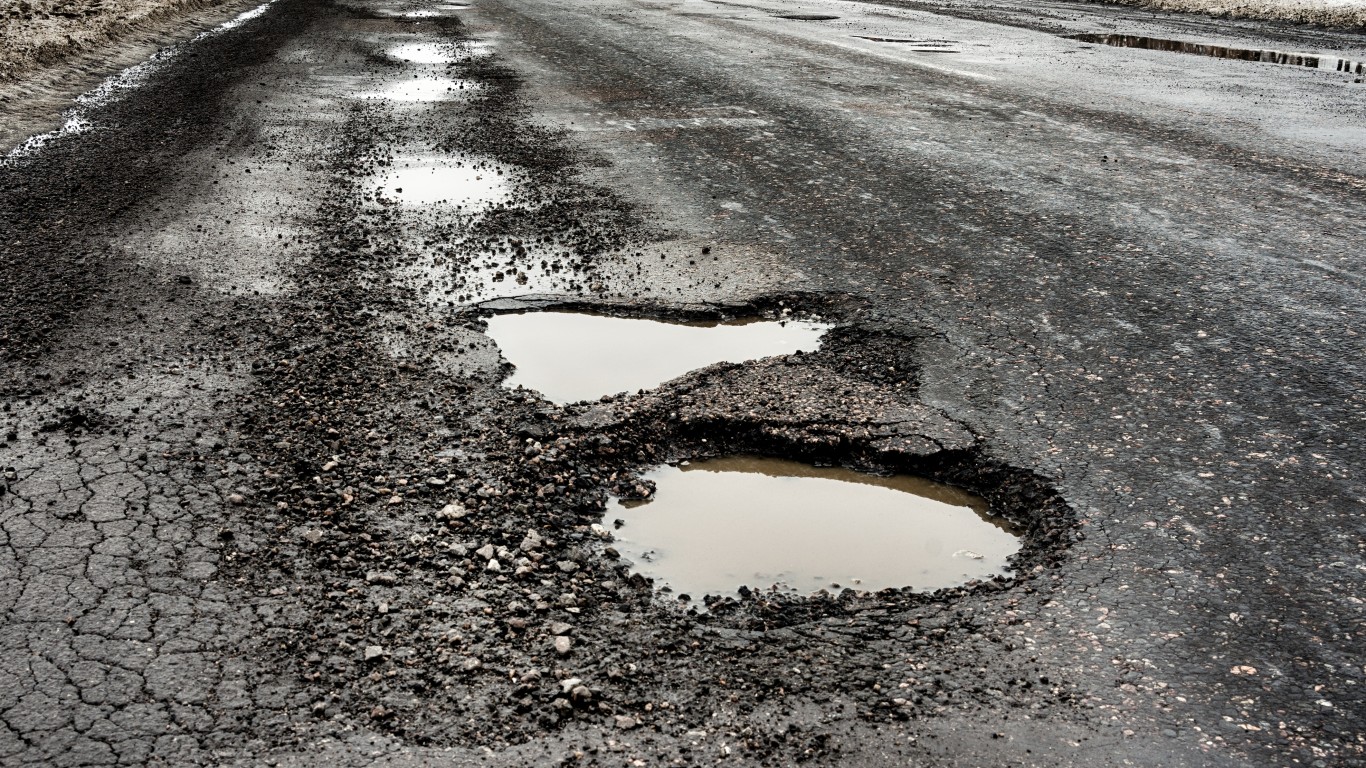
13. Condition of roads, bridges, and other infrastructure
> American adults who see issue as a “very big problem”: 34% of those surveyed (tied)
> Likely Democratic voters who see issue as a “very big problem”: 37% of those surveyed (13th highest of 16 issues in survey)
> Likely Republican voters who see issue as a “very big problem”: 29% of those surveyed (12th highest of 16 issues in survey)
Just over one-in-every-three American voters see the condition of roads, bridges, and other infrastructure as a very big problem – and with good reason. A 2021 report from the American Society of Civil Engineers assigned U.S. public infrastructure an average letter grade of C- based on performance in 17 major categories, including roads, drinking water, transit, dams, and bridges. According to the report, the U.S. needs to invest an additional $2.6 trillion in infrastructure over the next 10 years.
Democrats are more likely to view infrastructure as a political priority, and in November 2021, President Joe Biden signed the Infrastructure Investment and Jobs Act into law, authorizing $1.2 trillion in federal spending over a five-year period, including $550 billion in new spending to rebuild public works and transportation infrastructure.
[in-text-ad-2]
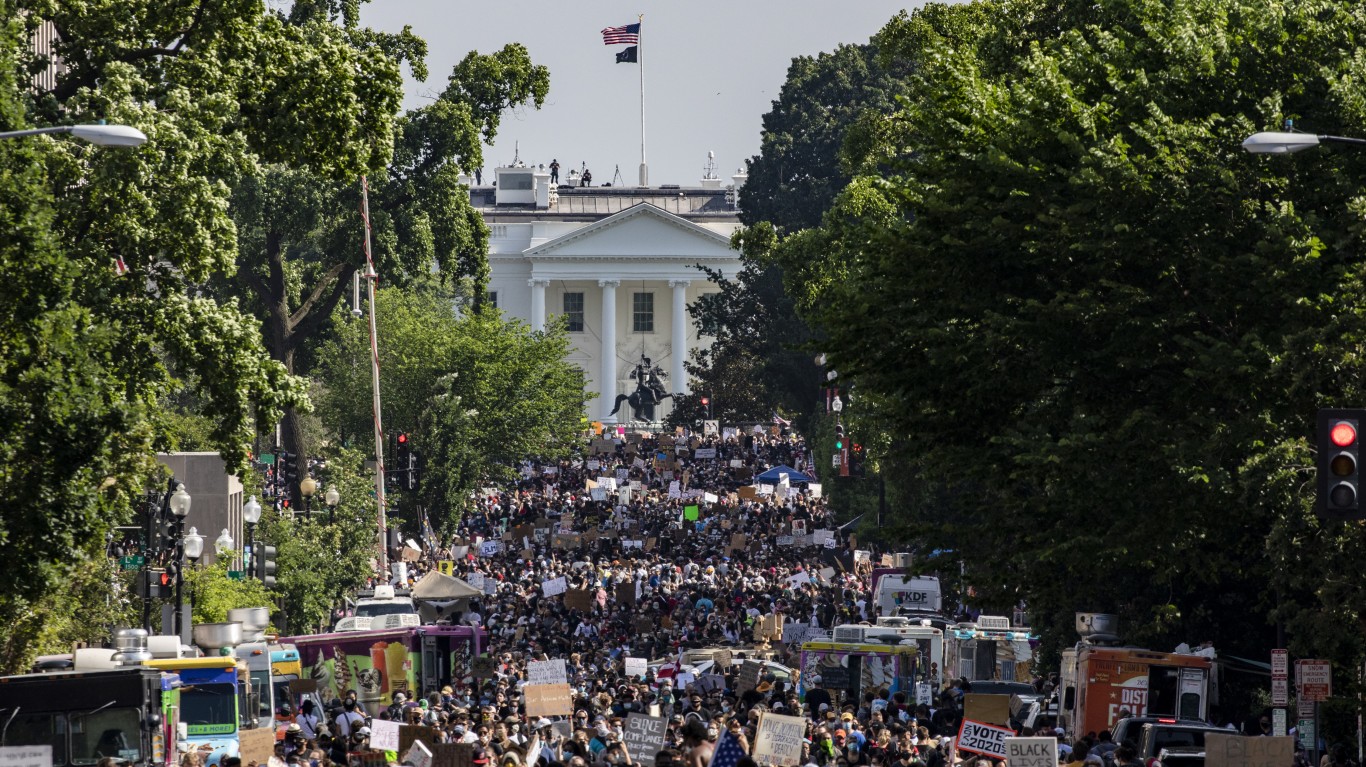
12. Racism
> American adults who see issue as a “very big problem”: 35% of those surveyed
> Likely Democratic voters who see issue as a “very big problem”: 55% of those surveyed (6th highest of 16 issues in survey)
> Likely Republican voters who see issue as a “very big problem”: 14% of those surveyed (the lowest of 16 issues in survey – tied)
Following the May 2020 murder of George Floyd by a Minneapolis police officer, race and racism dominated the political and social discourse in the United States. Now, three years later, Americans remain divided on the issue, largely along partisan lines. Over half of all Democrats and Democratic leaning voters see racism as a very big problem, compared to 35% of all voters, and only 14% of Republicans and Republican leaning independents.
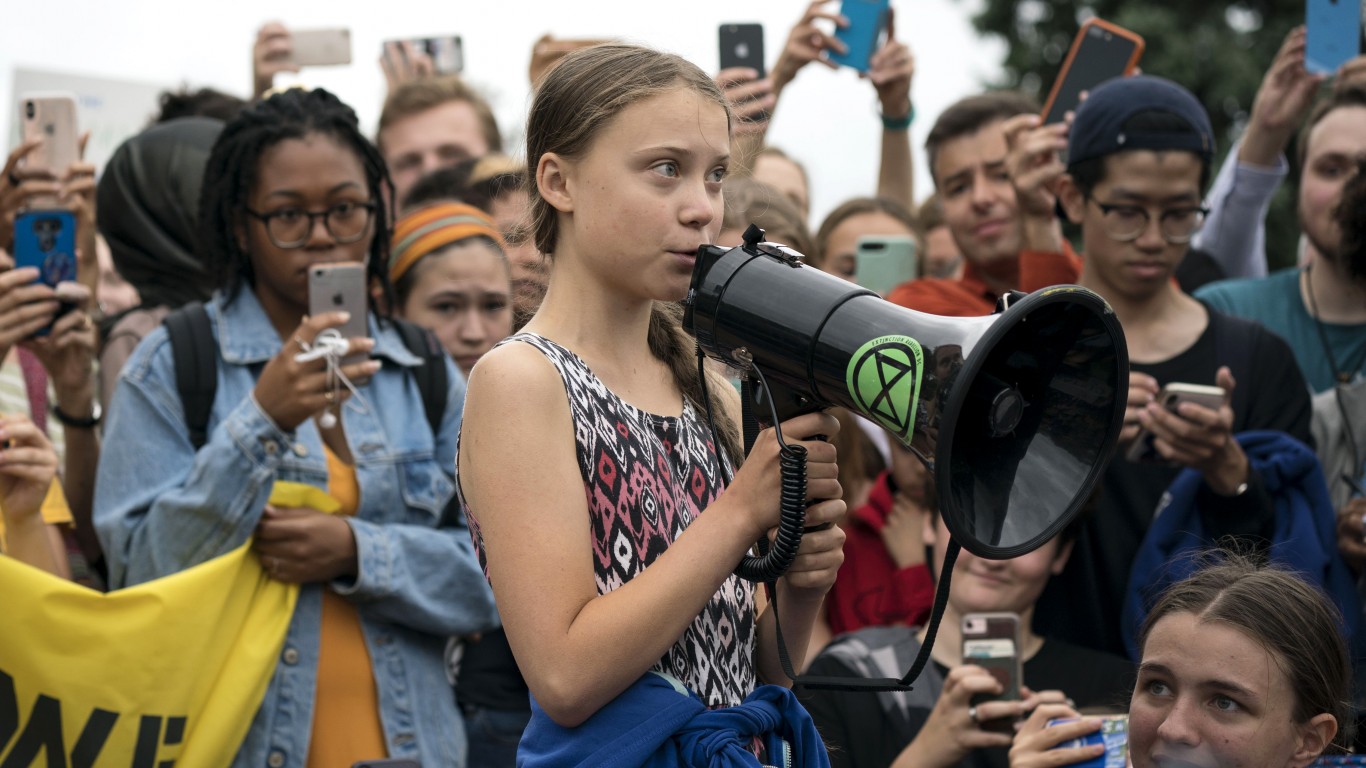
11. Climate change
> American adults who see issue as a “very big problem”: 39% of those surveyed
> Likely Democratic voters who see issue as a “very big problem”: 64% of those surveyed (3rd highest of 16 issues in survey)
> Likely Republican voters who see issue as a “very big problem”: 14% of those surveyed (the lowest of 16 issues in survey – tied)
With each passing year, the effects of climate change become increasingly plain. According to NASA, June 2023 was the hottest June on record for the planet, and early data from the World Meteorological Organization suggests July 2023 will be the hottest month on record.
Still, climate change is one of the most polarizing issues in American politics today. While 39% of surveyed voters see it as a very big problem, only 14% of Republican or Republican leaning voters do. Meanwhile, 64% of Democrats and Democratic leaning independents see it as a very big problem.
[in-text-ad]
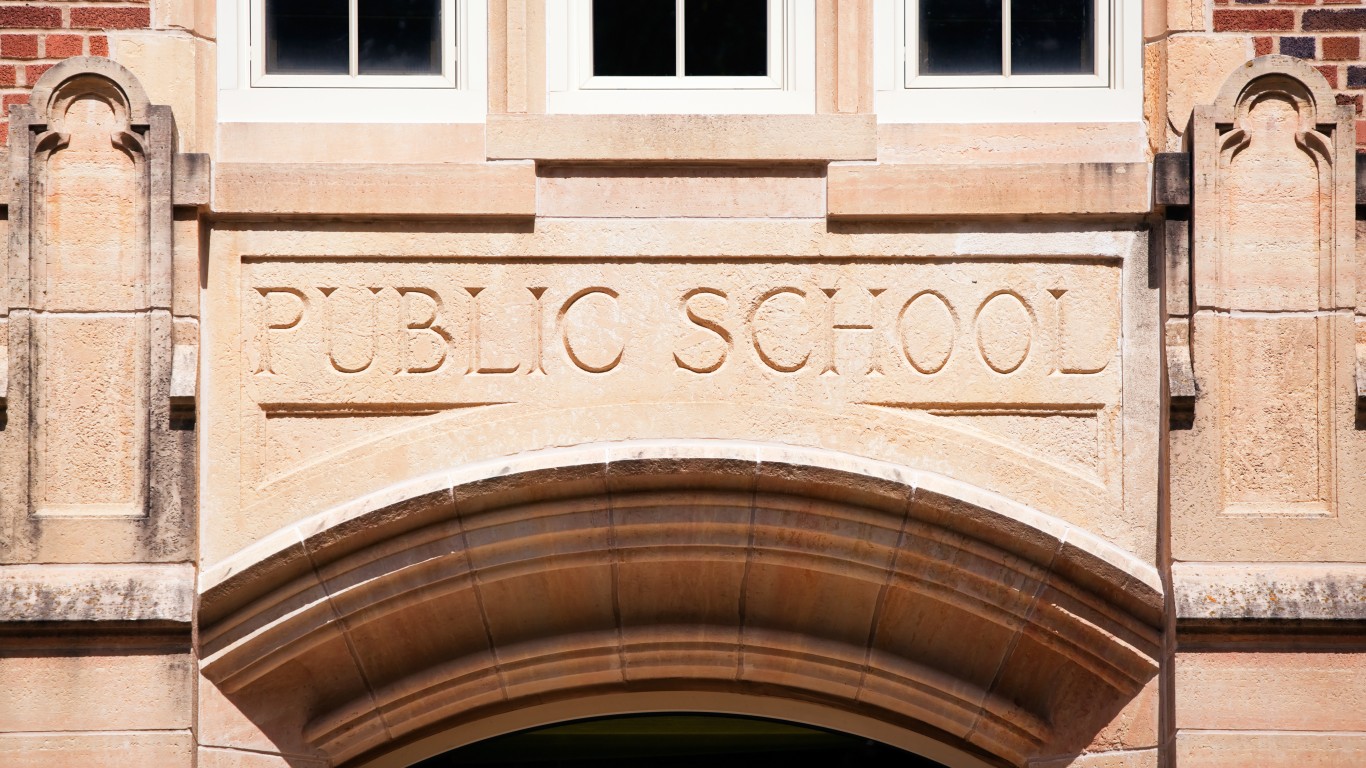
10. The quality of public K-12 schools
> American adults who see issue as a “very big problem”: 47% of those surveyed (tied)
> Likely Democratic voters who see issue as a “very big problem”: 43% of those surveyed (9th highest of 16 issues in survey)
> Likely Republican voters who see issue as a “very big problem”: 51% of those surveyed (9th highest of 16 issues in survey)
More so than most issues, general concerns over the quality of public K-12 schools are widely shared by members of both major parties, and 47% of all American adults. The specifics over public school policy are what divide Democrats and Republicans – and that divide is growing rapidly.
For example, one Pew survey found that the share of likely Republican voters with confidence in public school principals fell from 79% just before the pandemic to 52% in December 2021. Meanwhile, confidence among Democrats fell from 87% to 76%.

9. Illegal immigration
> American adults who see issue as a “very big problem”: 47% of those surveyed (tied)
> Likely Democratic voters who see issue as a “very big problem”: 25% of those surveyed (14th highest of 16 issues in survey)
> Likely Republican voters who see issue as a “very big problem”: 70% of those surveyed (3rd highest of 16 issues in survey)
The flow of illegal immigrants over the U.S. border with Mexico has been a central Republican talking point for years and has become something of a political liability for the Biden Administration. Between 2020 and 2022, the number of illegal border crossings in the Southwest surged by over 400% – from 458,000 to 2.4 million.
Still, the issue is far more important for Republican voters, as 70% of them see it as a very big problem, compared to 47% of all voters, and only 25% of Democratic voters.
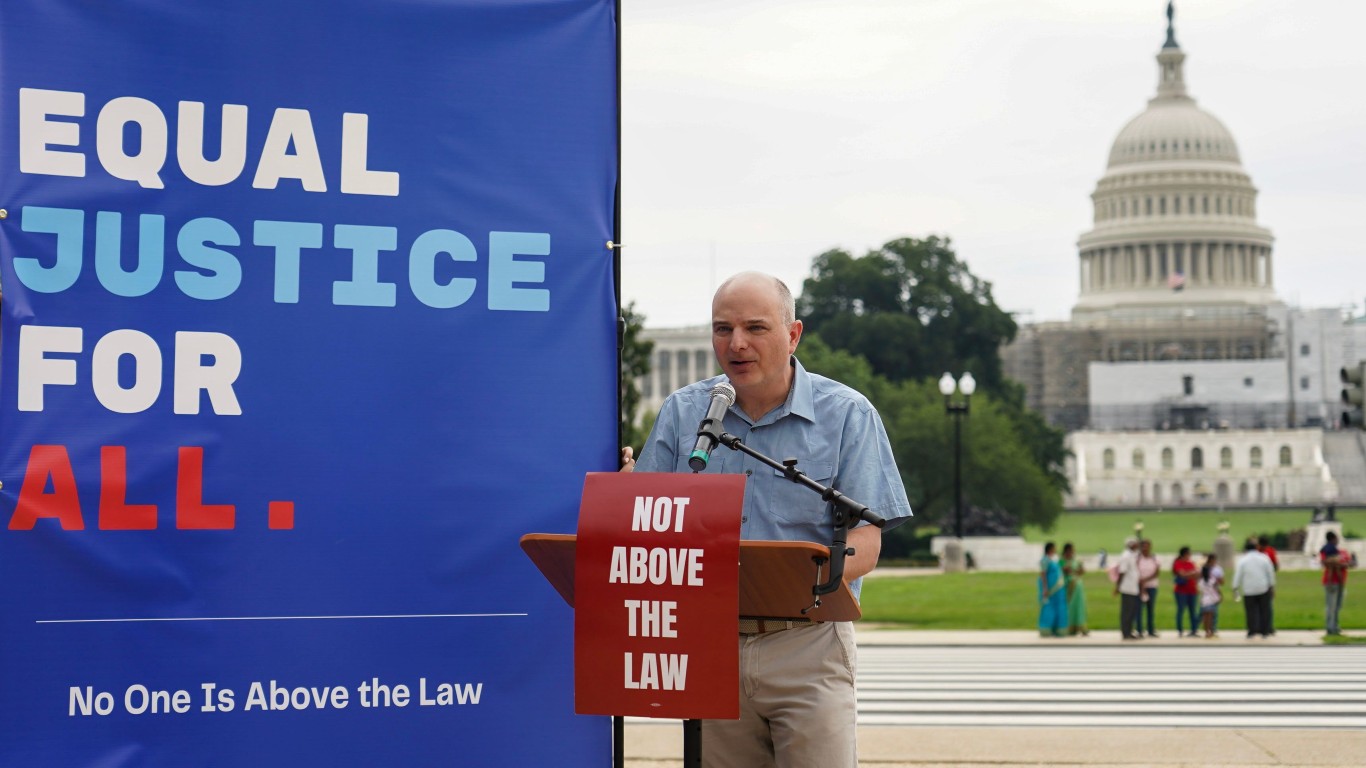
8. The state of moral values
> American adults who see issue as a “very big problem”: 54% of those surveyed
> Likely Democratic voters who see issue as a “very big problem”: 39% of those surveyed (11th highest of 16 issues in survey – tied)
> Likely Republican voters who see issue as a “very big problem”: 69% of those surveyed (4th highest of 16 issues in survey)
Over half of all American adults see the current state of moral values in the country as a very big problem. Republicans are far more likely to take issue with contemporary morality, as it is one of only four issues included in the survey that more than two-thirds of Republican and Republican leaning independents see as a major problem. Meanwhile, most of the 16 issues in the survey are seen as major problems to Democrats and Democratic leaning voters.
[in-text-ad-2]
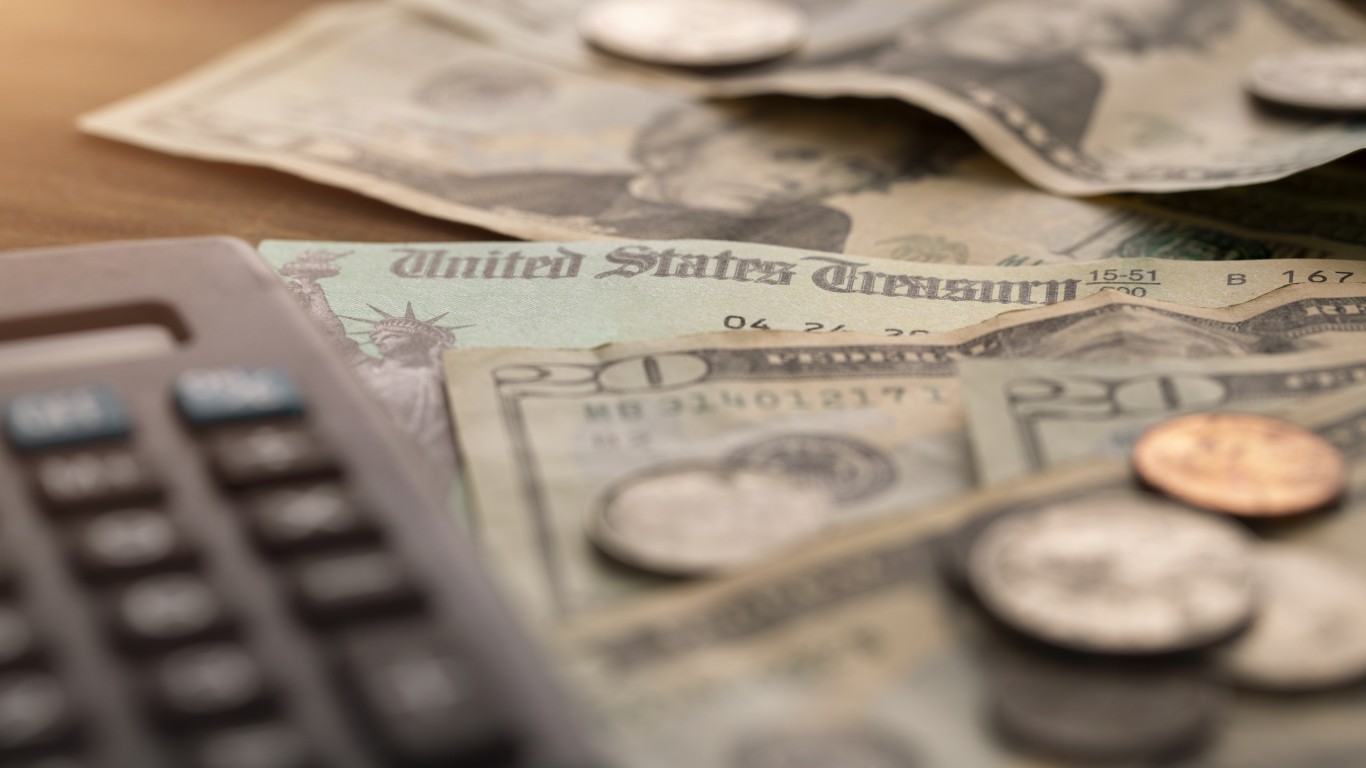
7. The federal budget deficit
> American adults who see issue as a “very big problem”: 56% of those surveyed
> Likely Democratic voters who see issue as a “very big problem”: 39% of those surveyed (11th highest of 16 issues in survey – tied)
> Likely Republican voters who see issue as a “very big problem”: 72% of those surveyed (2nd highest of 16 issues in survey)
In the last 22 years, the national debt has expanded by 445%, as the wars in Iraq and Afghanistan, the ongoing War on Terror, and the COVID-19 pandemic sent government spending soaring. At the same time, tax cuts and three economic recessions have reduced tax revenue, forcing the government to pay its bills with borrowed money.
Deficit spending, which contributes to the national debt year after year, is a very big problem for 56% of American voters. Among Republicans, it is the second most important issue, with 72% of surveyed Republicans and Republican leaning independents identifying it as a very big problem.

6. Violent crime
> American adults who see issue as a “very big problem”: 59% of those surveyed
> Likely Democratic voters who see issue as a “very big problem”: 52% of those surveyed (7th highest of 16 issues in survey – tied)
> Likely Republican voters who see issue as a “very big problem”: 64% of those surveyed (5th highest of 16 issues in survey – tied)
The U.S. violent crime rate has inched up in recent years. Still, it remains far lower than the highs reported in the 1990s and first decade of the 2000s. Currently, violent crime is seen as a major problem for 59% of the adult population – though Republicans are more likely to identify it as a serious issue than their Democratic counterparts.
[in-text-ad]
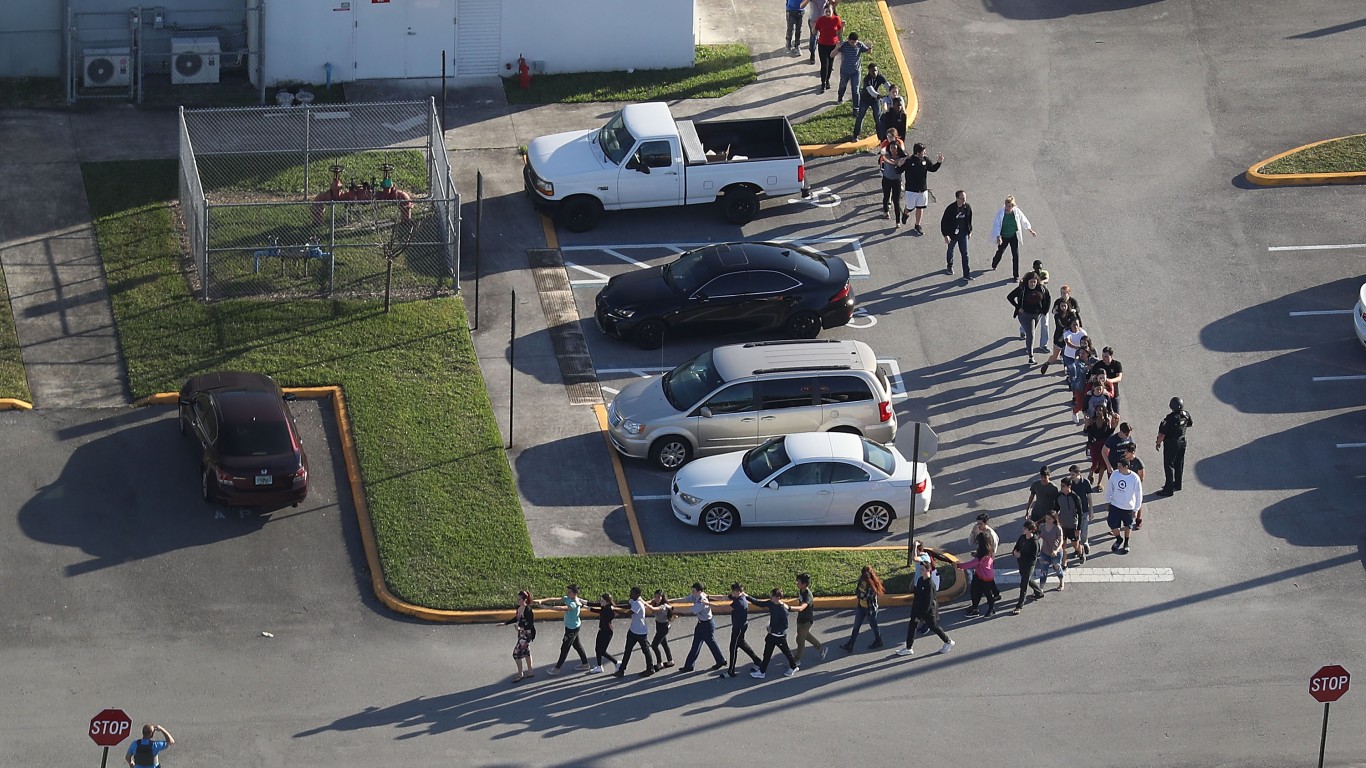
5. Gun violence
> American adults who see issue as a “very big problem”: 60% of those surveyed
> Likely Democratic voters who see issue as a “very big problem”: 81% of those surveyed (the highest of 16 issues in survey)
> Likely Republican voters who see issue as a “very big problem”: 38% of those surveyed (10th highest of 16 issues in survey)
Few political issues are more politically divisive than gun violence and what to do about it. Gun violence is the single most important issue for Democratic voters, with 81% of the cohort identifying it as a very big problem. Meanwhile, only 38% of Republican voters say that gun violence is a very big problem.

4. Drug addiction
> American adults who see issue as a “very big problem”: 61% of those surveyed
> Likely Democratic voters who see issue as a “very big problem”: 56% of those surveyed (5th highest of 16 issues in survey)
> Likely Republican voters who see issue as a “very big problem”: 64% of those surveyed (5th highest of 16 issues in survey – tied)
Drug addiction – particularly opioid addiction – is one of the biggest issues facing the United States, with 61% of voters identifying it as a very serious problem. The latest government data on overdoses shows the problem is rapidly getting worse. According to the Centers for Disease Control and Prevention, there were 21.4 fatal opioid overdoses for every 100,000 people in 2020, up from 6.8 per 100,000 in 2010, and 3.0 per 100,000 in 2000.
Among all the 16 issues reviewed, drug addiction has a relatively small partisan gap of just 8 percentage points.
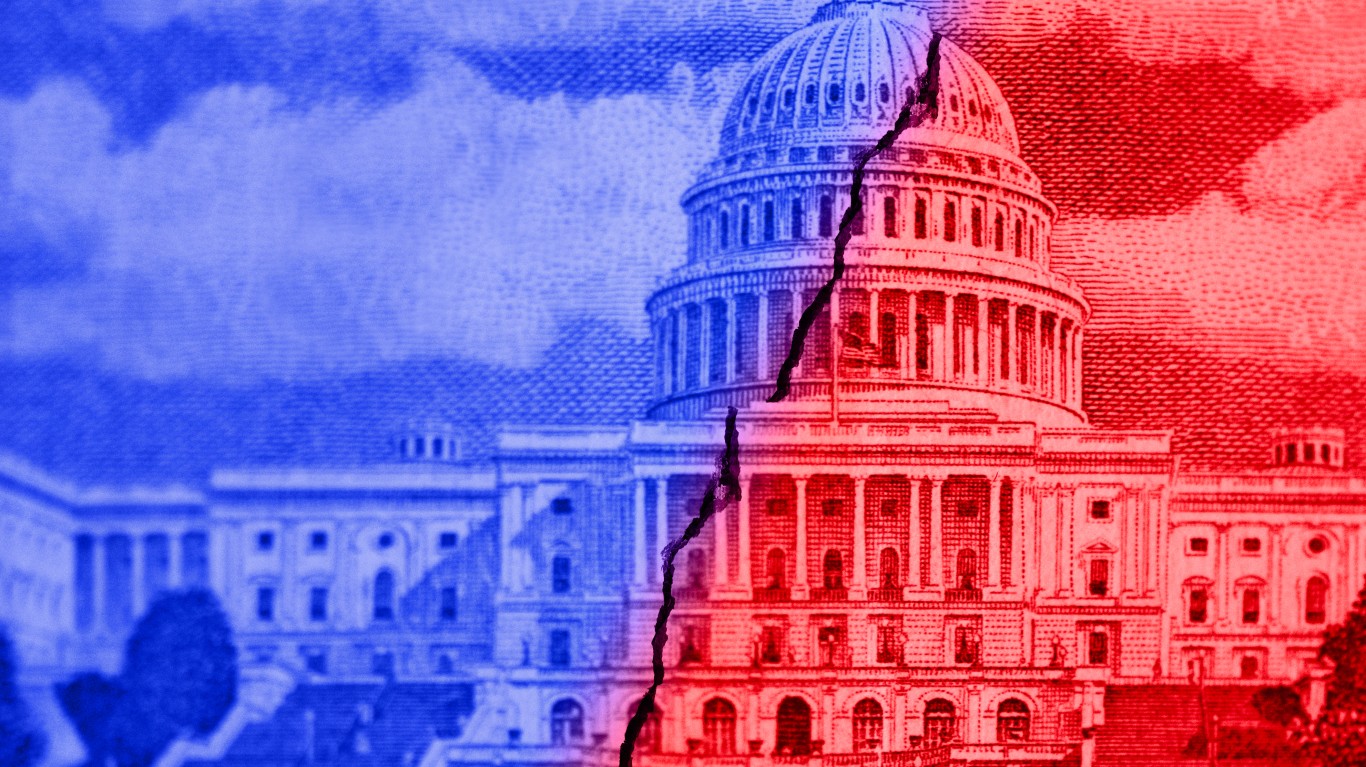
3. The ability of Democrats and Republicans to work together
> American adults who see issue as a “very big problem”: 62% of those surveyed
> Likely Democratic voters who see issue as a “very big problem”: 62% of those surveyed (4th highest of 16 issues in survey)
> Likely Republican voters who see issue as a “very big problem”: 63% of those surveyed (7th highest of 16 issues in survey)
Partisanship is nothing new in Washington, but in recent years, it has gotten far more pronounced and damaging. Both in Washington and across the country, Republicans and Democrats have different priorities and ideas about how to solve public problems. One area they align closely on is the issue of partisanship itself. A reported 62% of Democratic voters and 63% of Republican voters see the inability of the two major parties to work together as a very big problem.
[in-text-ad-2]
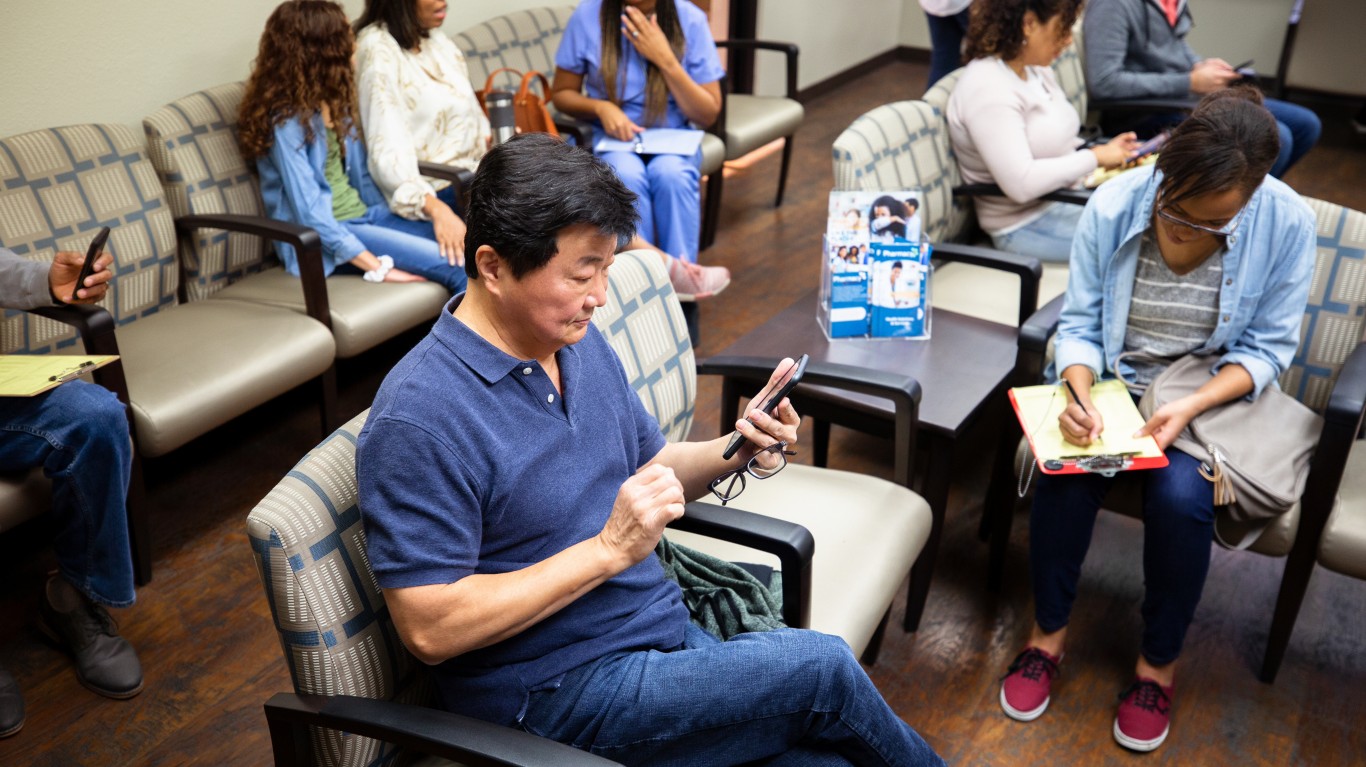
2. Health care affordability
> American adults who see issue as a “very big problem”: 64% of those surveyed
> Likely Democratic voters who see issue as a “very big problem”: 73% of those surveyed (2nd highest of 16 issues in survey)
> Likely Republican voters who see issue as a “very big problem”: 54% of those surveyed (8th highest of 16 issues in survey)
The number of Americans without health insurance has fallen considerably in recent years. Still, health care costs tend to rise faster than inflation overall, and health care affordability is the second most serious issue facing the country. Of all American adults surveyed by Pew, 64% identified health care affordability as a very big problem.
The share of Democrats who see it as a serious problem – 73% – is 19 points above the 54% of Republicans who do.
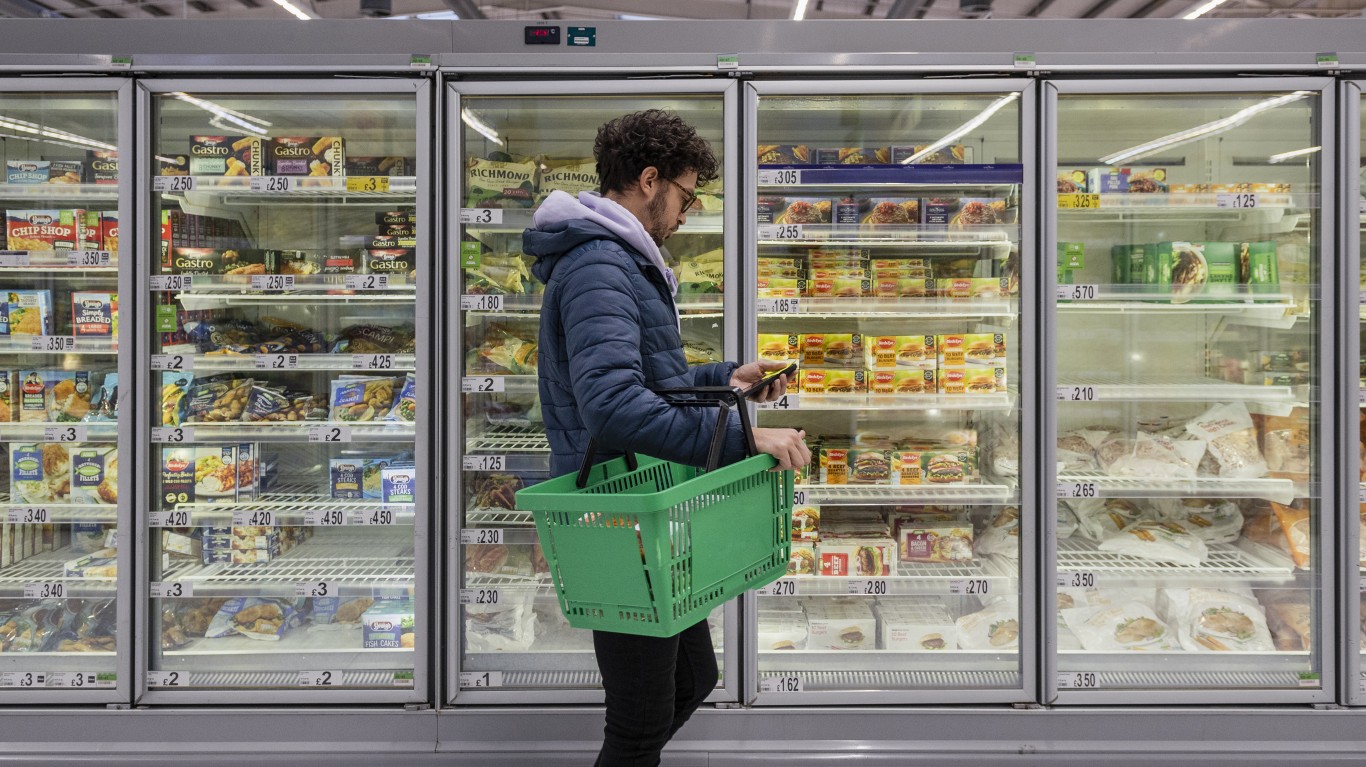
1. Inflation
> American adults who see issue as a “very big problem”: 65% of those surveyed
> Likely Democratic voters who see issue as a “very big problem”: 52% of those surveyed (7th highest of 16 issues in survey – tied)
> Likely Republican voters who see issue as a “very big problem”: 77% of those surveyed (the highest of 16 issues in survey)
After a series of interest rate hikes by the Federal Reserve Bank, the consumer price index is down substantially from a historic high of 9.1% in June 2022. Still, at 3%, inflation remains higher than the Fed’s target rate of 2%.
Among U.S. adults surveyed, 65% identified inflation as a very big problem, a larger share than any of the other 15 issues included in the study. Inflation is the single-most important issue for Republican voters, with 77% of the cohort identifying it as a very big problem. Meanwhile, 52% of Democratic voters say that inflation is a very big problem.
Find a Qualified Financial Advisor (Sponsor)
Finding a qualified financial advisor doesn’t have to be hard. SmartAsset’s free tool matches you with up to 3 fiduciary financial advisors in your area in 5 minutes. Each advisor has been vetted by SmartAsset and is held to a fiduciary standard to act in your best interests. If you’re ready to be matched with local advisors that can help you achieve your financial goals, get started now.
Thank you for reading! Have some feedback for us?
Contact the 24/7 Wall St. editorial team.
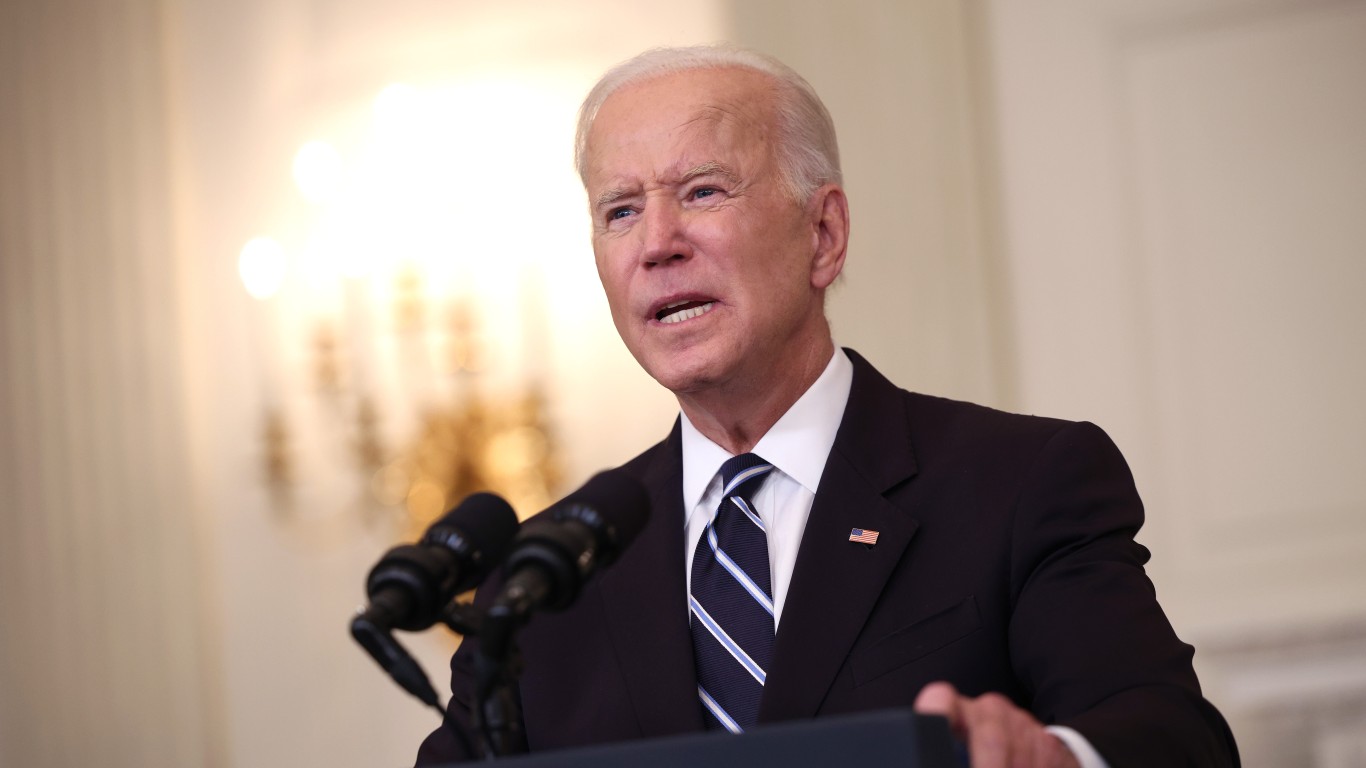 24/7 Wall St.
24/7 Wall St. 24/7 Wall St.
24/7 Wall St.